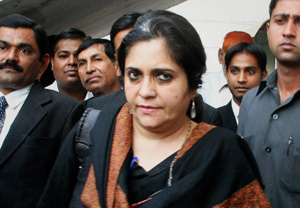Mumbai, Jul 24: In a breather to social activist Teesta Setalvad and her husband, the Bombay High Court today granted the duo 17-day interim relief from arrest in a CBI case alleging that her company received Rs 1.8 crore from abroad without mandatory approval from Centre.
Justice Mridula Bhatkar, while granting Teesta and her husband Javed Anand interim protection from arrest till August 10, said the duo was already given protection by the sessions court.
Teesta and Anand moved the high court seeking anticipatory bail after a special CBI court today rejected their pre-arrest bail pleas and also refused to extend the interim relief granted to them earlier on July 17.
"At this stage I do not want to go into merits. Is there any chance of the accused persons absconding? If no, then interim protection can be granted for a period of two weeks," Justice Bhatkar said.
The court directed Teesta and her husband to appear before the office of Economic Offences Wing of CBI on July 27 and 30 and on August 3 and 6 for recording their statement from 12pm to 3pm.
The court refused to agree to the CBI's demand to direct the duo to appear before the agency everyday.
"They (Teesta and Javed) have been appearing before you (CBI) from July 17. You must have done some investigation. Everyday appearance is not required," Justice Bhatkar said.
Public Prosecutor Sandeep Shinde, appearing for CBI, argued that the offence was of a serious nature and custodial interrogation was required.
The court has posted their anticipatory bail petitions for final hearing on August 10.
Soon after the sessions court rejected her bail pleas, Teesta told the court that she was shocked and aggrieved.
"I am shocked and aggrieved by the verdict as this is a petty offence. My sympathisers feel that this is an attempt (by the government) to intimidate and possibly eliminate us by the powers (sic)," she said.
The CBI had on July 8 registered a case against Teesta and Anand alleging that her firm Sabrang Communication and Publishing Pvt Limited (SCPPL) received around 2.9 lakh USD in foreign donations in violation of Foreign Contribution Regulation Act (FCRA).
According to the agency, SCPPL was not registered under FCRA for collecting money from abroad and the amount of nearly Rs 1.8 crore (2.9 lakh USD) was, therefore, received in violation of the Act as the organisation needed to seek prior approval from the Union Home Ministry.
Teesta and her husband, through their lawyer, had told the special CBI court that they were innocent and were falsely implicated.
Her advocate Mihir Desai told the court that the only reason why the agency wanted to arrest them was to humiliate them for their work in Gujarat.
However, CBI in their reply, last Friday, had said that the motive behind the transfer of foreign contribution to SCPPL reflected interference towards the internal security and activities of India.
"Such act of foreign donor would prejudicially affect the security, strategic, scientific and economic interest of the state and also affect the harmony between religious, social, linguistic or regional groups, castes or communities", the CBI had said in its reply while opposing her plea.
The agency said the allegations against them (Setalvad and Anand) are serious in nature and it is proposed to unravel all the contours of the offence and the conspiracy during the investigation.
Setalvad alleged that the FIR registered against her and her husband was for the purpose of harassing and torturing them, a charge rejected by CBI.
"The applicants are deliberately mixing up the offences alleged against them with non-related issues in order to divert the attention from the serious charges against them," the agency had said.
The CBI had also told the court that when their premises were searched on July 14 this year there was total resistance and non-cooperation from their side.
"During the search, an agreement dated September 22, 2006 between Ford Foundation and SCPPL were seized which clearly showed that the remittances were grants. There is no mention of any 'consultancy' therein," the reply had said.





Comments
Add new comment